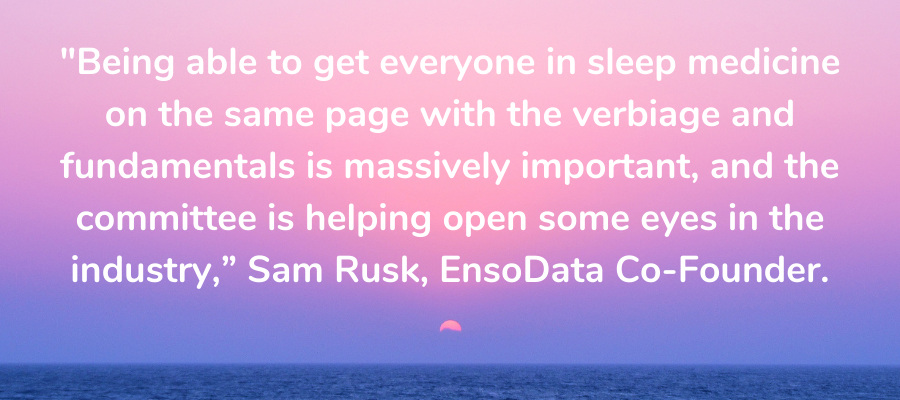Written by: Sam Rusk, EnsoData Co-Founder and President
Like everyone on this planet, sleep accounts for around a third of my day-to-day life. Unlike most people on this planet, sleep also accounts for another third or more, as my work is also dedicated to sleep, and specifically, the intersection of sleep medicine and artificial intelligence. With that in mind, I’m excited to answer a few questions from our marketing team in an ask-me-anything-style interview.
1. How did you get on the AASM AI Committee in the first place?
In short, I applied and I was accepted. The application process included sharing my work experience, the publications I co-authored, and a statement of my general vision and thoughts of the future in sleep medicine and how AI will play a pivotal role. I emphasized our goal at EnsoData of harnessing data and the latest technology to make healthcare more accurate, affordable, and available to all. That aligns well with the committee’s number one goal for 2021/2022: “To identify emerging trends and evolving AI technologies and collaborate with the Technology Innovation Committee to provide an analysis of their impact through an annual report to the membership.”2. Who are some of the influential people you’ve met on the AASM AI committee?
Tough question. There are honestly a dozen people on the committee who deserve recognition on a question like this, but two come to my mind. First, Dr. Cathy Goldstein, who led the committee in my first year. While Dr. Goldstein isn’t currently serving on the committee, she was instrumental in establishing the committee and setting the bar for future success. Similarly, I want to commend the current committee Chair, Dr. Anuja Bandyopadhyay, for embracing the lead role and advocating so strongly for sleep medicine. Earlier this year, Dr. Bandyopadhyay and I were guests on the AASM’s Talking Sleep Podcast, hosted by Dr. Seema Khosla. You can still listen to the episode (Season 3, Episode 7) on demand.“I’m confident in their ability to lead the committee and really do some awesome work in sleep medicine,” Sam Rusk.
3. What’s one thing you learned from the committee?
Another good question. I hope this doesn’t sound too basic, but I think the committee has helped frame a lot of different aspects of sleep for me in a new light. There are so many stakeholders in sleep medicine from patients to clinicians to hospital administrators, figuring out the right language and mediums to help communicate how AI will affect sleep is a critical responsibility. It seems simple at times, but those conversations have a high impact and help pave the way for wider clinical adoption of AI, and that’s a big missing piece that is needed in the sleep community right now. In short, awareness is a big thing, and it is very powerful at this stage to have access to materials, resources, and insights the committee can provide. Being able to get everyone in sleep medicine on the same page with the verbiage and fundamentals is massively important, and the committee is helping open some eyes in the industry.4. What’s a plan the AASM AI committee has for the coming years?
To be consistent with our official committee messaging, but also tease the committee resource, I am going to paraphrase three of our five goals, all of which you can find on the AASM site here, under the Artificial Intelligence in Sleep Medicine Committee.- To develop educational content and more awareness in the sleep community around AI solutions and what AI can do for sleep medicine in general.
- To help identify AI technologies in areas for sleep research that may have a high impact in sleep medicine overall.
- To create and implement an AI and auto scoring pilot certification program for AI software.
5. What are your personal goals in being on the committee?
I think one area where I can really bring insight to the committee is by helping lower the boundaries between clinicians and researchers to facilitate the evolution of AI’s place in sleep medicine, and to help people better understand the fundamental technologies moving forward.6. To close, what is your overall impression of the AASM AI committee’s future?
I am thrilled to be working on all the initiatives around pushing sleep research forward, helping to educate the community, and facilitating a better understanding of AI’s capabilities in sleep medicine. These initiatives are all areas where we see AI impacting sleep medicine in the next five years. We’re still early in the AI adoption cycle, and there is a long way to go, but I’m confident that we’re taking the right steps here in 2022 and beyond.With that, thank you for taking some time to hear about my experience on the AASM Artificial Intelligence in Sleep Medicine committee.You can learn more about our own AI, EnsoSleep, on our AI Scoring FAQ page.






